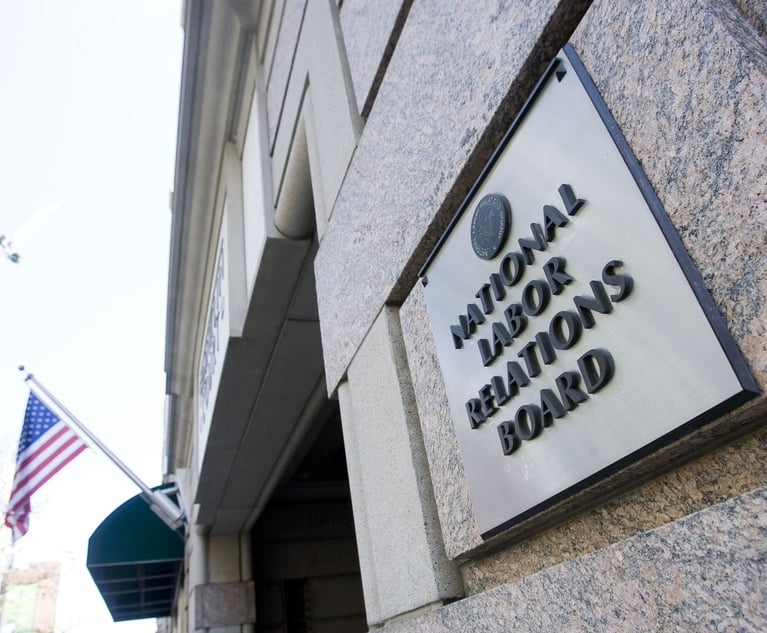CFIUS Imposes 'Historic' $1M Penalty for Breach of Mitigation Agreement
The unprecedented civil penalty was imposed in 2018 without fanfare but was published on its resource page along with annual reports to Congress.
April 12, 2019 at 06:08 PM
5 minute read
 Mario Mancuso, a partner with Kirkland & Ellis. Courtesy photo.
Mario Mancuso, a partner with Kirkland & Ellis. Courtesy photo.
The Committee on Foreign Investment in the United States has imposed an unprecedented $1 million civil penalty for repeated breaches of a 2016 CFIUS mitigation agreement, according to a notice on the U.S. Treasury Department's website.
The penalty was imposed in 2018 without fanfare but was recently published on its resource page along with annual reports to Congress. The penalty was also imposed for “failure to establish requisite security policies and failure to provide adequate reports to CFIUS,” according to the notice.
CFIUS is an interagency committee that reviews mergers and acquisitions of U.S. companies by foreign investors for potential risks to U.S. national security.
No further information about the parties or the specific transaction involved was disclosed by the committee, whose actions normally are confidential.
Asked for comment, a Treasury Department representative said: “The Committee on Foreign Investment in the United States (CFIUS) takes very seriously the negotiation and enforcement of agreements that mitigate national security risk. As the Treasury Department, which chairs CFIUS, recently posted on its website, in 2018 CFIUS imposed a $1 million penalty for violation of a CFIUS mitigation agreement. The penalty related to repeated breaches of a 2016 mitigation agreement, including failure to establish requisite security policies and failure to provide adequate reports to CFIUS. This action demonstrates CFIUS's commitment to enforcement. The Committee relies on negotiated mitigation agreements in order to resolve national security concerns, and we expect companies to adhere to them.”
The representative did not provide further details about the parties involved or the transaction in response to a request for more information. In recent years, however, CFIUS has been increasingly focused on the security of personally identifiable information, and it has been requiring companies to spin off or otherwise segregate units with personal data on Americans as a condition of approving transactions. Other CFIUS concerns that have resulted in mitigation requirements or even rejections lately include high-technology transfers and location of facilities near military bases or other strategic locations.
“This penalty is singular. It is historic. It is the first time that CFIUS has imposed a penalty for noncompliance,” said Mario Mancuso, leader of the international trade and national security practice at Kirkland & Ellis in Washington, D.C. He said the committee is “demonstrating a new commitment to actually enforce—and to signal its willingness to enforce—its mitigation requirements when parties fail to abide by their agreements.”
Mancuso added, “Mitigation agreements should not be seen as boilerplate. They are not paper agreements. There is also a sense in which it is signaling to the market that CFIUS is focused on enforcement broadly.”
Usually CFIUS's internal workings occur in a “black box” because of confidentiality rules, but its actions have come to light more often in recent years. For instance, Toshiba announced on Thursday that China's ENN Ecological Holdings Co. had withdrawn its offer for Toshiba's U.S. liquified natural gas business because of failure to win approval from CFIUS and shareholders by a closing date.
An overhaul of CFIUS legislation enacted by Congress last year expanded the scope of transactions that are subject to mandatory rather than voluntary review by the committee and imposed new penalties for noncompliance. On Oct. 10, the U.S. Treasury Department published new pilot program regulations in its first step toward implementing the just-passed Foreign Investment Risk Review Modernization Act, or FIRRMA.
In 2016, when the sanctioned transaction occurred, CFIUS had received 172 notices and conducted 79 investigations, with one presidential rejection: In December of that year, on the committee's recommendation, President Barack Obama blocked the acquisition of Aixtron, a technology company with U.S. facilities, by Chinese-controlled Fujian Grand Chip Investment Fund. A total of 27 CFIUS notices were withdrawn, 15 notices were withdrawn-and-refiled and five were withdrawn and abandoned that year because of national security concerns. Seven notices were withdrawn for other reasons, according to the Treasury Department.
Mancuso, who authored the recently published “A Dealmaker's Guide to CFIUS,” said he believed CFIUS' imposition of penalties would have been more effective had it been formally publicized. “A million dollars is a lot of money. To many parties I suspect it will get their attention. But monetary plus being publicly identified would have gotten more. They chose to make it public but not to publicize it.”
He added, “I suspect the next shoe to drop will be a transaction that should have been filed under the pilot program for which one wasn't submitted and CFIUS will double down on this enforcement theme by imposing a penalty for not submitting a mandatory declaration.”
Chinese foreign direct investment in the United States tumbled to $4.8 billion last year, down from $29 billion in 2017 and $46 billion in 2016, according to Rhodium Group research.
This content has been archived. It is available through our partners, LexisNexis® and Bloomberg Law.
To view this content, please continue to their sites.
Not a Lexis Subscriber?
Subscribe Now
Not a Bloomberg Law Subscriber?
Subscribe Now
NOT FOR REPRINT
© 2025 ALM Global, LLC, All Rights Reserved. Request academic re-use from www.copyright.com. All other uses, submit a request to [email protected]. For more information visit Asset & Logo Licensing.
You Might Like
View All

Trump Fires EEOC Commissioners, Kneecapping Democrat-Controlled Civil Rights Agency

Testing Legal Authority, Trump Fires NLRB Member, Leaving Panel Without Quorum
3 minute readTrending Stories
- 1Trump's DOJ Files Lawsuit Seeking to Block $14B Tech Merger
- 2'No Retributive Actions,' Kash Patel Pledges if Confirmed to FBI
- 3Justice Department Sues to Block $14 Billion Juniper Buyout by Hewlett Packard Enterprise
- 4A Texas Lawyer Just Rose to the Trump Administration
- 5Hogan Lovells Hires White & Case Corporate and Finance Team in Italy
Who Got The Work
J. Brugh Lower of Gibbons has entered an appearance for industrial equipment supplier Devco Corporation in a pending trademark infringement lawsuit. The suit, accusing the defendant of selling knock-off Graco products, was filed Dec. 18 in New Jersey District Court by Rivkin Radler on behalf of Graco Inc. and Graco Minnesota. The case, assigned to U.S. District Judge Zahid N. Quraishi, is 3:24-cv-11294, Graco Inc. et al v. Devco Corporation.
Who Got The Work
Rebecca Maller-Stein and Kent A. Yalowitz of Arnold & Porter Kaye Scholer have entered their appearances for Hanaco Venture Capital and its executives, Lior Prosor and David Frankel, in a pending securities lawsuit. The action, filed on Dec. 24 in New York Southern District Court by Zell, Aron & Co. on behalf of Goldeneye Advisors, accuses the defendants of negligently and fraudulently managing the plaintiff's $1 million investment. The case, assigned to U.S. District Judge Vernon S. Broderick, is 1:24-cv-09918, Goldeneye Advisors, LLC v. Hanaco Venture Capital, Ltd. et al.
Who Got The Work
Attorneys from A&O Shearman has stepped in as defense counsel for Toronto-Dominion Bank and other defendants in a pending securities class action. The suit, filed Dec. 11 in New York Southern District Court by Bleichmar Fonti & Auld, accuses the defendants of concealing the bank's 'pervasive' deficiencies in regards to its compliance with the Bank Secrecy Act and the quality of its anti-money laundering controls. The case, assigned to U.S. District Judge Arun Subramanian, is 1:24-cv-09445, Gonzalez v. The Toronto-Dominion Bank et al.
Who Got The Work
Crown Castle International, a Pennsylvania company providing shared communications infrastructure, has turned to Luke D. Wolf of Gordon Rees Scully Mansukhani to fend off a pending breach-of-contract lawsuit. The court action, filed Nov. 25 in Michigan Eastern District Court by Hooper Hathaway PC on behalf of The Town Residences LLC, accuses Crown Castle of failing to transfer approximately $30,000 in utility payments from T-Mobile in breach of a roof-top lease and assignment agreement. The case, assigned to U.S. District Judge Susan K. Declercq, is 2:24-cv-13131, The Town Residences LLC v. T-Mobile US, Inc. et al.
Who Got The Work
Wilfred P. Coronato and Daniel M. Schwartz of McCarter & English have stepped in as defense counsel to Electrolux Home Products Inc. in a pending product liability lawsuit. The court action, filed Nov. 26 in New York Eastern District Court by Poulos Lopiccolo PC and Nagel Rice LLP on behalf of David Stern, alleges that the defendant's refrigerators’ drawers and shelving repeatedly break and fall apart within months after purchase. The case, assigned to U.S. District Judge Joan M. Azrack, is 2:24-cv-08204, Stern v. Electrolux Home Products, Inc.
Featured Firms
Law Offices of Gary Martin Hays & Associates, P.C.
(470) 294-1674
Law Offices of Mark E. Salomone
(857) 444-6468
Smith & Hassler
(713) 739-1250






